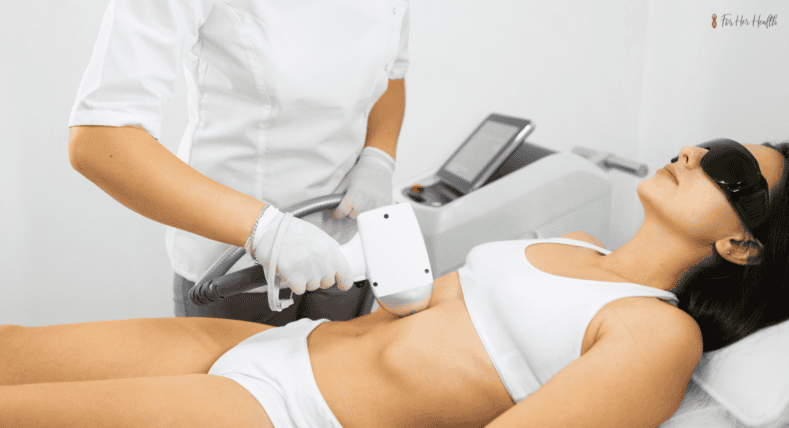Menopause and Medical Grade Skincare
Menopause is a significant life transition that brings about a myriad of physical and hormonal changes in women. Among the various challenges faced during this phase, one that prominently affects both physical appearance and emotional well-being is the issue of skin laxity. As estrogen levels decline, the skin undergoes transformations that lead to reduced elasticity, firmness, and hydration. In response to these changes, the use of medical-grade skin products has emerged as a key strategy for both preventing and treating menopausal skin laxity.
Understanding Menopausal Skin Changes:
Hormonal Shifts:
- Estrogen Decline: Estrogen, a hormone produced primarily in the ovaries, plays a crucial role in maintaining skin health. It contributes to the production of collagen and elastin, proteins responsible for skin structure and elasticity. As menopause approaches, estrogen levels decrease, leading to a decline in these essential components.
- Impact on Collagen and Elastin: Collagen provides structural support to the skin, while elastin allows it to stretch and bounce back. The reduction in estrogen levels during menopause results in decreased collagen and elastin production, leading to loss of skin firmness and elasticity.
Changes in Hydration:
- Decreased Hyaluronic Acid: Hyaluronic acid is a naturally occurring substance in the skin that helps maintain hydration by retaining water molecules. Menopausal hormonal changes contribute to a decline in hyaluronic acid levels, leading to reduced skin hydration.
- Thinning of the Epidermis: The epidermis, the outermost layer of the skin, undergoes thinning during menopause. This thinning contributes to increased vulnerability to environmental factors and a loss of the skin’s ability to retain moisture.
Impact on Skin Thickness and Texture:
- Dermal Atrophy: Menopausal hormonal changes result in dermal atrophy, a condition characterized by the thinning of the skin’s dermal layer. This thinning contributes to a reduction in skin thickness and may result in the development of fine lines and wrinkles.
- Texture Changes: Changes in skin texture, including roughness and uneven tone, are common during menopause. Reduced collagen and elastin levels, along with decreased cell turnover, contribute to these textural changes.
Medical-Grade Skin Products for Prevention:
Retinoids:
- Stimulating Collagen Production: Retinoids, derivatives of vitamin A, are renowned for their ability to stimulate collagen production. They promote cell turnover, helping to maintain skin thickness and firmness. Regular use of retinoids can contribute to the prevention of menopausal skin laxity.
- Addressing Fine Lines and Wrinkles: By promoting cell renewal, retinoids address fine lines and wrinkles that may emerge during menopause. They enhance skin texture and promote a smoother, more youthful appearance.
Hyaluronic Acid:
- Optimizing Hydration: Medical-grade skin products containing hyaluronic acid help replenish the skin’s moisture content. These formulations enhance hydration, addressing the dryness that often accompanies menopausal hormonal changes.
- Plumping Effect: Hyaluronic acid has a plumping effect on the skin, helping to reduce the appearance of fine lines and providing a more youthful and supple complexion.
Peptides:
- Boosting Collagen Synthesis: Peptides are amino acid chains that play a role in collagen synthesis. Medical-grade skin products containing peptides can support the skin’s natural collagen production, contributing to improved firmness and elasticity.
- Enhancing Skin Repair: Peptides also aid in skin repair processes. They may help diminish the effects of environmental damage and contribute to overall skin resilience.
Antioxidants:
- Neutralizing Free Radicals: Antioxidants such as vitamin C and E neutralize free radicals, which are unstable molecules that can contribute to skin aging. Medical-grade products with potent antioxidants protect the skin from oxidative stress.
- Brightening and Even Tone: Antioxidants contribute to a brighter complexion by reducing the appearance of age spots and promoting an even skin tone. This is particularly beneficial for addressing uneven pigmentation associated with menopausal skin changes.
Medical-Grade Skin Products for Treatment:
Retinoids (Continued):
- Reducing Hyperpigmentation: Retinoids can contribute to the reduction of hyperpigmentation, such as age spots and sunspots, which may become more pronounced during menopause. Their exfoliating properties help reveal a more even skin tone.
- Improving Skin Texture: Continued use of retinoids can lead to improvements in skin texture by addressing roughness and promoting a smoother surface. This effect is beneficial for individuals experiencing changes in skin texture during menopause.
Growth Factors:
- Stimulating Cellular Renewal: Growth factors are naturally occurring proteins that play a key role in cell proliferation and tissue repair. Medical-grade products containing growth factors can stimulate cellular renewal, aiding in the repair of damaged skin.
- Enhancing Collagen and Elastin: Growth factors contribute to the synthesis of collagen and elastin, essential proteins for maintaining skin structure and elasticity. Their use can lead to improved firmness and resilience.
Alpha Hydroxy Acids (AHAs):
- Exfoliating Dead Skin Cells: AHAs, including glycolic acid and lactic acid, exfoliate dead skin cells, promoting cellular turnover. This exfoliation can contribute to a smoother complexion and address textural irregularities.
- Improving Skin Radiance: The exfoliating action of AHAs enhances skin radiance by removing dull, dead skin cells. This can be particularly beneficial for individuals experiencing a dull complexion during menopause.
Collagen-Boosting Formulations:
- Direct Collagen Stimulation: Some medical-grade products are formulated specifically to directly stimulate collagen production. These formulations often contain a combination of peptides, growth factors, and collagen-stimulating ingredients.
- Improving Skin Thickness: By addressing dermal atrophy and promoting collagen synthesis, collagen-boosting formulations contribute to improved skin thickness. This effect can help minimize the appearance of fine lines and wrinkles.
Incorporating Medical-Grade Skin Products into a Skincare Routine:
Customizing the Routine:
- Assessment of Individual Needs: A personalized approach to skincare involves assessing individual skin needs, considering factors such as skin type, concerns, and lifestyle. This assessment helps tailor a skincare routine that addresses specific menopausal skin changes.
- Consultation with Skincare Professionals: Seeking guidance from skincare professionals, such as dermatologists or licensed aestheticians, can provide valuable insights into effective medical-grade products and their appropriate use.
Gradual Introduction:
- Start Slowly: When incorporating new medical-grade products into a skincare routine, it is advisable to start slowly. This allows the skin to acclimate to the formulations and minimizes the risk of irritation.
- Monitor Skin Response: Regularly monitoring the skin’s response to new products is essential. If any signs of irritation or sensitivity arise, adjustments can be made to the skincare routine.
Consistent Application:
- Adherence to Routine: Consistency is key to seeing results with medical-grade skin products. Adhering to a regular skincare routine ensures that the skin receives the intended benefits of the formulations.
- Patience and Persistence: Achieving optimal results takes time, and patience is crucial. Persistent adherence to a skincare routine, coupled with realistic expectations, enhances the likelihood of positive outcomes.
To Conclude:
Menopausal skin laxity is a multifaceted concern that goes beyond cosmetic considerations, impacting a woman’s sense of self-confidence and well-being. The integration of medical-grade skin products into a comprehensive skincare routine offers a proactive and targeted approach to both prevention and treatment. By addressing the underlying causes of menopausal skin changes and harnessing the benefits of advanced formulations, women can navigate this life stage with confidence, embracing the potential for healthier, more resilient skin. As with any skincare regimen, consultation with skincare professionals and a personalized approach contribute to optimal outcomes, ensuring that the chosen products align with individual needs and preferences. In the realm of menopausal skincare, the synergy between science-backed formulations and a holistic skincare routine paves the way for enhanced skin health and vitality.



